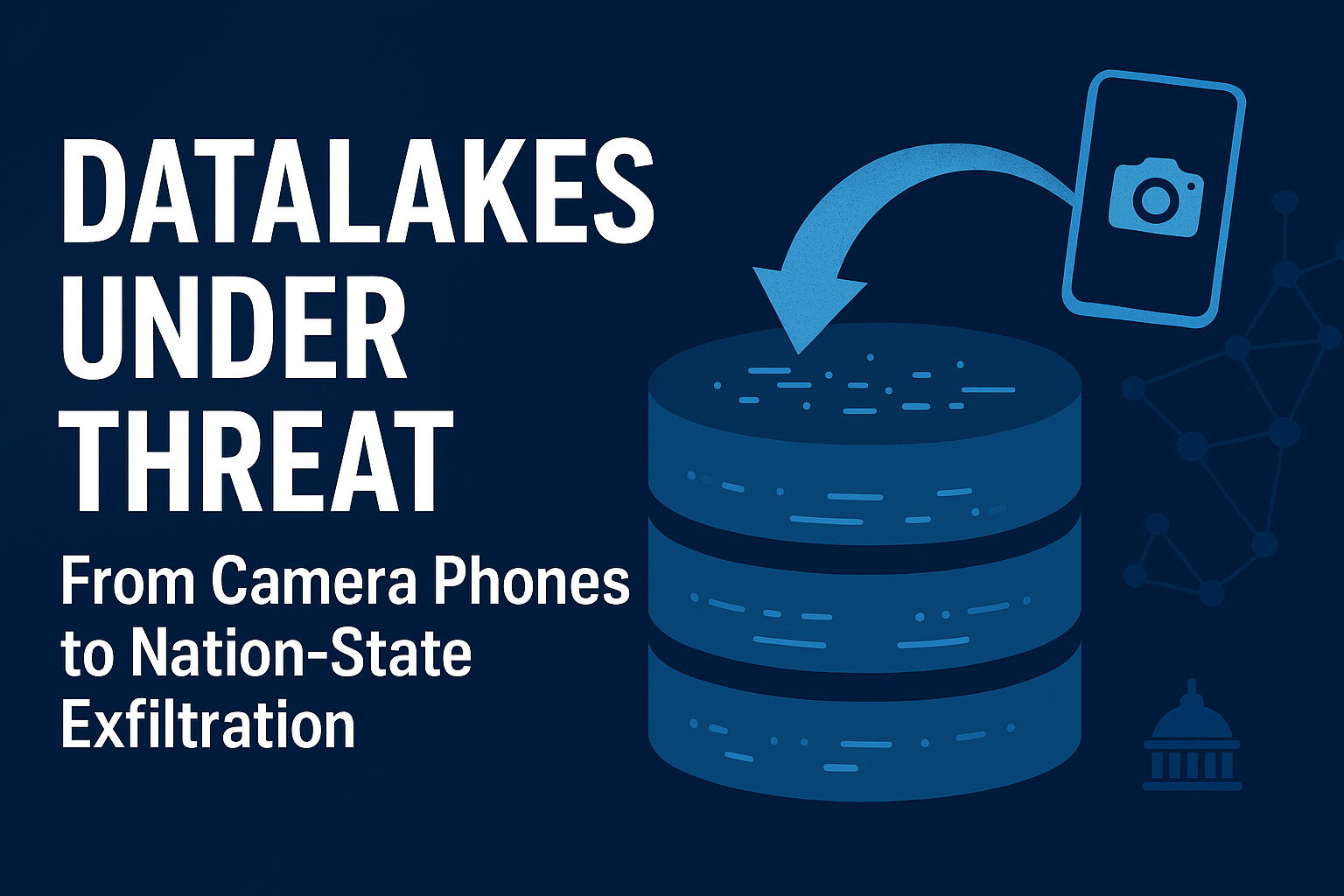Data lakes are the backbone of modern enterprises. They collect and store massive amounts of information from across the business. Customer records, financial transactions, HR data, operational telemetry, and even security intelligence all flow into one central pool. This makes data lakes incredibly powerful for analytics and decision-making. It also makes them a prime target for insider threat actors.
What makes data lakes especially vulnerable is the wide range of ways insiders can steal information. From a simple smartphone photo to advanced nation-state tradecraft, data lakes present opportunities for exploitation at every level of sophistication.
The Spectrum of Insider Exfiltration
Low-tech methods: the camera phone problem
Sometimes the most dangerous methods are the simplest. An insider can photograph sensitive dashboards, query results, or printed reports with a smartphone. This bypasses encryption, access policies, and logging.
- Screens photographed directly from analyst workstations
- Meeting rooms where dashboards are projected
- Printed reports captured with a phone camera
These actions leave no digital trail inside the data lake. They are invisible to monitoring systems and difficult to attribute.
Mid-level technical exploits: blending in with normal workflows
Insiders with moderate technical skills can exploit data lakes using legitimate tools.
- Unauthorized access using valid credentials
- Privilege escalation through misconfigured identity policies
- Data exfiltration via queries that look routine
- Rogue ingestion pipelines that siphon off streams
These actions often look like normal analytics activity, which makes them hard to detect without behavioral monitoring.
Advanced insider techniques: stealth and obfuscation
Highly skilled insiders may use advanced techniques to hide their tracks.
- Breaking exfiltrated data into small chunks and exporting them slowly
- Embedding sensitive data inside innocuous files or images
- Using encrypted personal cloud storage or messaging apps
- Exploiting metadata catalogs to locate valuable datasets quickly
These techniques require more expertise but are still within reach of determined insiders.
Nation-state level exfiltration: precision and scale
At the highest level, nation-state actors or insiders working with external intelligence services can weaponize data lakes.
- Deploying custom malware that blends into ingestion pipelines
- Exploiting supply chain vulnerabilities in third party tools
- Taking advantage of cloud misconfigurations at scale
- Using covert channels such as DNS tunneling or disguised API calls
- Recruiting insiders directly to combine human intelligence with technical tradecraft
These operations are precise, stealthy, and often undetectable until the damage is done.
Exploitable Areas Inside the Data lake
Across all levels of sophistication, insiders exploit the same weak spots:
| Exploitable Area | How It Is Abused |
| Access controls | Overly permissive roles allow browsing of sensitive zones |
| Data catalogs | Metadata exposes the location of crown jewel datasets |
| Ingestion pipelines | Rogue data injection or siphoning off streams |
| Analytics tools | Queries extract sensitive data without triggering alerts |
| Audit gaps | Lack of granular logging hides unauthorized access |
| Cloud storage buckets | Misconfigured buckets expose raw data internally |
Mitigation Strategies Across the Spectrum
Technical controls
- Enforce least privilege identity policies
- Encrypt data at rest, in transit, and in logs
- Segment sensitive zones to reduce blast radius
- Enable granular logging for queries and access events
Behavioral analytics
- Monitor for anomalies in query patterns and access times
- Train insider threat models to detect deviations from normal behavior
- Reduce alert fatigue with contextual enrichment
Governance and policy
- Classify sensitive datasets and enforce access tiers
- Conduct periodic access reviews to remove dormant roles
- Establish incident response playbooks for insider misuse
- Enforce no phone policies in secure zones to counter low tech exfiltration
Final Thoughts
Data lakes are powerful engines of business intelligence. They are also vulnerable at every level of sophistication. From the employee who snaps a photo of a dashboard to the nation state actor who deploys covert malware, insiders can exploit data lakes in ways that bypass traditional defenses.
The lesson is clear. Insider threat mitigation must be layered. Technical controls, behavioral analytics, governance, and physical security all play a role. Only by addressing the full spectrum of risk can organizations transform their data lakes from insider goldmines into secure fortresses.
Sources
- Imperva: Insider Threats in Cloud Data Lakes
- AWS Security Best Practices: Securing Data Lakes
- Microsoft Defender for Cloud: Insider Risk Management






